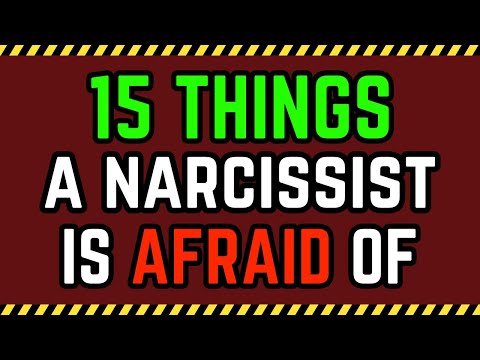Things Narcissists Are Secretly Afraid Of. Are you dealing with a narcissist and feeling like you’re always at a disadvantage? Well, the tables are about to turn. Today, we’re diving into the hidden fears that narcissists secretly grapple with. Trust me, this insight will empower you like never before. So, let’s peel back the layers and shine a light on these vulnerabilities.
1. Rejection.
Narcissists enjoy being the center of attention and receiving compliments from others. They have an unquenchable desire for praise and approval, which helps to support their frail sense of self. Their inflated ego is seriously threatened by rejection, which also brings on feelings of inadequacy.
As a result, they become afraid of being rejected or thought inadequate by the people seeking their approval. This fear of rejection drives a narcissist to manipulate and dominate others to keep themselves in the spotlight and win the admiration they yearn for.
Narcissists may feel excruciating levels of guilt and humiliation when they are rejected. They could interpret rejection as a personal jab at their superiority and worthiness. To protect their fragile egos, they often go to great lengths to avoid situations where rejection is possible, such as surrounding themselves with individuals who constantly affirm that grandiose self-perception.
Related:
4 signs you’re abandoning yourself without realizing it
Best 12 signs of a mentally strong man
12 things smart people never do
10 must-know signs you dealing with narcissistic abuse
2. Criticism.
Narcissists have an inflated sense of significance and a constant need for approval. Their flimsy egos are injured when criticism pierces their carefully manufactured picture of perfection. They frequently find it difficult to tolerate constructive criticism or sincere worries, which undermines their exaggerated sense of self.
They may strongly reject criticism that deviates from their inflated self-image because they harbor a deep-seated dread of being seen as flawed or imperfect. In addition to damaging their self-esteem, criticism often brings on feelings of helplessness, which they struggle to suppress. As a result, narcissists prefer to be around people who constantly compliment them and they get extremely defensive if their shortcomings are ever brought up.
3. Abandonment.
Because of their great need for ongoing admiration and attention, narcissists profoundly dread being abandoned. Being abandoned or left alone puts their sense of control under stress and damages their self-worth. They rely on others to uphold their lofty self-image and affirm their self-worth. Narcissists use manipulative tactics and take control of their relationships because they fear abandonment.
They could make tremendous efforts to make sure they are always the center of attention, continuously looking for validation from people around them. Because of their ingrained anxieties and feelings of worthlessness, narcissists are driven to cling to their relationships no matter what it takes, including engaging in possessive and dominating behavior.
4. Being Exposed.
Narcissists meticulously construct and maintain a facade of perfection and superiority to gain admiration and control over others. They fear being exposed because it threatens their carefully crafted image, which they rely on for validation and power. The idea of having their true nature or flaws revealed fills them with anxiety and dread.
The narcissist’s ingrained insecurity and fear of rejection are intimately related to their dread of exposure. They take tremendous pains to shape how people see them, carefully selecting their interactions and faking circumstances to uphold the intended perception. Any indication of their weaknesses, insecurities, or flaws can shatter the facade they have built, possibly resulting in rejection and losing the respect they seek.
5. Failure.
Narcissists flourish when others think highly of them and their accomplishments. They have an unquenchable need for achievement and praise because it validates their loftiness notions of themselves. Failure poses a danger to their carefully cultivated image because it undermines their self-righteousness and fosters feelings of worthlessness. The fear of failure drives narcissists to relentlessly pursue success and validation.
They often set lofty goals and compete to prove their exceptionalism. Failure is not an option for them as it chips away at their inflated self-esteem and exposes their vulnerabilities. They may go to great lengths to avoid situations where failure is likely, taking calculated risks or manipulating circumstances to ensure that they come out on top.
6. Vulnerability.
Narcissists thrive on projecting an image of invulnerability and supremacy. They see vulnerability as a sign of weakness and view emotional exposure as a threat to their carefully constructed facade. Consequently, they fear being vulnerable and avoid situations requiring them to reveal their true emotions or inner securities.
Vulnerability means relinquishing control and opening themselves up to potential criticism or rejection. For a narcissist, it contradicts their desire to maintain power and admiration. They often struggle with genuine emotional connection and intimacy, as it requires them to let their guard down and expose their authentic selves, which they fear may not be as exceptional as they project.
7. Being Ignored.
Narcissists have an insatiable need for attention and admiration, which fuels their sense of self-importance. Being ignored or overlooked directly contradicts this craving and undermines their perceived superiority. It is deeply unsettling for narcissists, as it challenges their belief that they are the center of attention and that others should constantly validate their existence.
Their vulnerability and insecurities are exposed by their fear of being ignored. Being ignored challenges the inflated self-image that narcissists depend on for support, as they believe they have complete control over how others see them. They could make considerable efforts to get people’s attention, looking for opportunities to be the center of attention or using deceptive methods to keep themselves in the spotlight.
8. Losing Control.
Narcissists naturally crave control because it feeds their sense of superiority and power. Because it would damage their carefully cultivated sense of superiority and invincibility, they are afraid of losing control. The narcissist’s demand for approval and admiration is intimately related to their fear of losing power. Any apparent loss of control is seen as a direct attack on their self-perceived excellence, because they feel entitled to power and influence over others.
9. Intimacy.
Intimacy puts a sense of power and self-importance at risk for narcissists. It calls for them to consider and acknowledge the wants and needs of another person, which may conflict with their demand for unceasing adoration and attention. Intimacy’s natural vulnerability also reveals their vulnerabilities and potential weaknesses, which people strive to conceal.
Narcissists may manipulate, be emotionally detached, or even seek relationships solely for self-gratification to avoid true intimacy. Their fear of being emotionally exposed or dependent on others limits their ability to develop authentic and mutually satisfying connections, perpetuating a cycle of shallow relationships and a lack of genuine emotional intimacy.
10. Empathy.
Narcissists commonly lack empathy, as their self-centered nature makes it difficult for them to understand and connect with the emotions of others. They may fear facing their own emotional deficits and being confronted with the depth of others’ feelings.
Empathy requires the ability to genuinely consider and respond to the emotions of others, which challenges the narcissist’s self-focused perspective. The fear of empathy also stems from the narcissist’s need to maintain a sense of prestige and control. Empathy necessitates acknowledging the experiences and emotions of others, which may reveal vulnerabilities and flaws in the narcissist’s worldview.
11. The Repercussions of Their Actions.
Narcissists could be afraid of the consequences of their exploitative or manipulative acts. Despite appearing untouchable, they are still susceptible to the negative effects of their actions. Narcissists might worry that their unethical behavior will have negative legal or social effects. Lying, cheating, or manipulating people for personal benefits are examples of exploitative behavior that can have serious legal and social repercussions.
12. Being Overshadowed.
Narcissists have an insatiable need for attention and admiration, always seeking to be the focal point of any situation. Consequently, they fear being overshadowed or outshined by others. Being in the background threatens their sense of significance and challenges their belief in their exceptionalism. The fear of being overshadowed exposes their deep-seated insecurity and fragile self-esteem. Narcissists rely on constant validation and attention to maintain their grandiose self-image.
13. Insignificance.
The need to be regarded as exceptional and extraordinary is deeply ingrained in narcissists. They fear appearing unimportant or common because it undermines their lofty self-image and sense of superiority. Their exaggerated self-importance is challenged by the notion of being just like everyone else.
The fear of insignificance exposes their underlying insecurity and anxiety about being overlooked or forgotten. Narcissists crave constant validation and admiration to reaffirm their self-perceived exceptionalism. Being seen as ordinary or unremarkable challenges their inflated egos and triggers feelings of worthlessness and inadequacy.
14. Invalidation.
Narcissists are constantly seeking external affirmation of their self-worth. Having their opinions dismissed, achievements downplayed, or feelings disregarded threatens them beyond words. This is because invalidating their experiences undermines their grandiose self-image and challenges just how special they really are. Narcissists greatly rely on the recognition and validation of others to maintain their mental well-being.
15. Loneliness.
Narcissists often rely on external validation to fill the void within themselves, using relationships and attention to avoid facing their inner emptiness. The idea of being truly alone with their thoughts and emotions can be unsettling, as it forces them to confront their limitations and the hollowness their grandiosity seeks to conceal. They may engage in manipulative behaviors or seek out new relationships to fill the void and ward off the discomfort of true loneliness.
The fear of being alone drives their persistent pursuit of external validation, as they desperately seek to escape the profound emptiness beneath their surface.
Related:
4 signs you’re abandoning yourself without realizing it
Best 12 signs of a mentally strong man







Leave a Comment